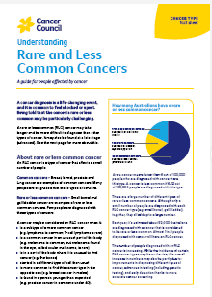- Home
- Rare and less common (RLC) cancers
- Treatment
- Treatment options
Treatment options for RLC cancers
Below we look at the treatment options that are available for people diagnosed with rare and less common (RLC) cancers.
Learn more about:
Overview
Depending on the RLC cancer type or how advanced it is, treatment may include surgery, radiation therapy, chemotherapy, immunotherapy and targeted therapy. You may also be offered newer treatments, such as cell and gene therapies or personalised cancer vaccines. Treatment is sometimes part of a clinical trial.
Some people with cancer will have one treatment, but often people need a combination of treatments (e.g. surgery and targeted therapy). Treatments may sometimes be given at the same time. An example of this is chemoradiation – when radiation therapy and chemotherapy are given together.
Your specialist will work with the multidisciplinary team to recommend the best treatment options for you.
For information about treatments and their side effects, call Cancer Council 13 11 20 or talk to your treatment centre, and see our general sections on surgery, chemotherapy, radiation therapy, immunotherapy, and targeted therapy.
Where will I have treatment?
To see specialist doctors or have specific treatment, people with an RLC cancer who live outside a major city may need to travel. Your doctor will let you know where the best place to have treatment is for you.
Rare Cancers Australia has a list of doctors and a list of Australian hospitals and treatment centres with cancer care services (for public and private treatment centres). Call 1800 257 600 or call Cancer Council 13 11 20.
Depending on the RLC cancer type, there may also be a support organisation that you can contact for a directory of specialists and treatment centres.
If you need to travel far from home for treatment, some costs may be covered. For example, some people may be able to get help paying for travel and accommodation through a government service or insurance. For more information, ask your treatment centre, doctor or call Cancer Council 13 11 20.
What to ask about your treatment
Information may not always be easily available for an RLC cancer, so ask your treatment team about:
- what treatment options are available and if they are different to treatments for the more common cancer
- the aim of treatment – whether it is trying to cure the cancer or control symptoms
- how long treatment may take and where you will have it
- any risks, short-term and long-term side effects, and how they can be managed
- how treatment will impact your ability to work, do everyday activities or your quality of life
- how you will know if treatment is working
- what will likely happen if you do not have treatment
- what costs may be involved, such as out-of-pocket expenses not covered by Medicare or private health cover, and any options if you cannot afford to pay
- what impact treatment may have on your sex life and fertility. Ask about any short-term or long-term side effects and ways to manage any changes.
- See Sexuality, intimacy and cancer and Fertility and cancer, and listen to our podcast on Sex and Cancer.
As my cancer was so rare, there were no specific protocols to treat it.
Wayne
→ READ MORE: Coping with a diagnosis
Podcast: Making Treatment Decisions
Listen to more episodes from our podcast for people affected by cancer
More resources
Dr Damien Kee, Medical Oncologist, Austin Health and Peter MacCallum Cancer Centre, and Clinical Research Fellow, Walter and Eliza Hall Institute, VIC; Emeritus Professor Phyllis Butow, Psychologist, The University of Sydney, NSW; Alison Danis, Consumer; Dr Michelle Harrison, Medical Oncologist, Chris O’Brien Lifehouse, NSW; Jess Pike, Senior Social Worker, Westmead Hospital, NSW; Trish Taylor, Consumer; Lesley Woods, 13 11 20 Consultant, Cancer Council WA.
View the Cancer Council NSW editorial policy.

